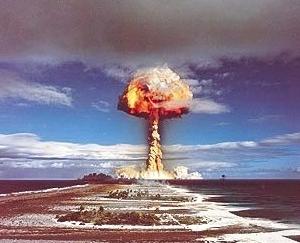Victims of French Nuclear Testing Scorn Meager Compensation
PARIS, France, March 25, 2009 (ENS) - French Defence Minister Herve Morin has offered 10 million euros to compensate, for the first time, victims of nuclear testing conducted by France both in Algeria and French Polynesia, between 1966 and 1996.
The compensation is part of a proposed bill Morin says will be presented to the Parliament by the end of June.
A budget appropriation of 10 million euros (US$13.5 million), allocated by the Ministry for Defence, is envisaged in the first year for the people suffering from diseases related to the nuclear tests, the minister said on Tuesday.
Roland Oldham, the president of the French Polynesian nuclear test veterans' group Association Moruroa e Tatou, called the offer "a bad joke."
"They announce a few million like that, just like we should be very happy, we should drop on our knees and say thank you to the French Government. But that's not the case at all, because it's peanuts," Oldham told Radio New Zealand. "It really is peanuts when you compare how the French government spends a lot of money on defense."
 |
An atomic bomb is tested at Muruoa Atoll in French Polynesia in 1970. (Photo credit unknown) |
Minister Morin called the offer "a solution that is right and humanistic."
The last French nuclear tests were completed in the Pacific 13 years ago and a treaty prohibitng further testing was signed by France in 1996. In total, 210 tests were carried out in the Sahara and in French Polynesia. During the test period, 150,000 people, both civil and military, were present on the sites, the Defence Ministry said in a statement.
"Only four tests in the Sahara posed problems of containment and 10 tests in Polynesia gave place to significant radioactive fallout on circumscribed zones," the ministry said.
Morin said the ministry will set up a telephone service to help victims navigate the steps required to make a military request for pension or disability payments.
A committee primarily made up of doctors and chaired by a magistrate will examine the requests for compensation, he said, and applicants will have a right of recourse to an administrative court, if they are not satisfied with the decisions in their cases.
Simultaneously, scientists independent of the Defence Ministry will be given access to the secret, still classified, files concerning the nuclear tests. Their report will bring out the most precise knowledge and most complete data on radiological monitoring during the French nuclear tests, the minister said.
But Oldham says the French plan is not good for the victims. He says there needs to be a health structure to help them, and that the environmental impact of the nuclear testing should not be ignored.
In a separate proceeding in April, the French government must respond to charges it failed to protect its French Polynesian workers from fall-out during the Pacific nuclear tests.
An industrial relations tribunal in Papeete, Tahiti determined on September 15, 2008 that France must account for the consequences of nuclear testing on the health of people in its Pacific territory.
Three former workers who claim their blood cancers were caused by French nuclear testing will argue their case before the tribunal. The widows of five workers who died of blood cancers are also taking action against France.
 |
A French nuclear weapons test on Mururoa Atoll in 1970. (Photo credit unknown) |
"We have no doubt these eight will win their case because you can't get leukemia on the beach, huh? We are afraid that even if the judge decides in our favor, the army in France, the Defence Ministry, all will appeal the decision and it will take another year," says Moruroa e Tatou coordinator John Doom.
"If the court delays again, the last three will die before they see justice. They are really not in good health," said Doom. If the men had been born in France, their descendants could continue with the claim. But when a French Polynesian complainant dies, only the widow can continue the legal battle.
Each of the former workers and widows is seeking compensation of $US200,000 for illnesses related to radioactive fallout from the tests.
"Why, when the French worked, after three or four hours after testing they had security equipment, and the Tahitian had only his shirt? They didn't have gloves or shoes, why?" asked Doom, outraged. "Can the French explain?"
"Our people were used like machinery," Doom said.
Doom says several hundred former workers will show up at the hearing. Among them will be the President of French Polynesia Oscar Temaru, who worked at Moruroa Atoll where the French nuclear testing took place. He has since been elected president four times beginning in 2004 and was re-elected most recently in February.
Mururoa, and its sister atoll Fangataufa, were the site of extensive nuclear testing by France between 1966 and 1996, as well as the site of numerous protests by various vessels, including the Greenpeace sailing vessel Vega, captained by Canadian national David McTaggert, who went on to become the first chairman of Greenpeace International.
Copyright Environment News Service (ENS) 2009. All rights reserved. To subscribe or visit go to: http://www.ens-newswire.com